Fleurs du Mal Magazine


Or see the index

Grey Eyes
She glanced across the path to me,
Grey eyes!
Her looks were kisses plain to see.
I gave her glances back to her —
Glad eyes!
She saw the lifting of despair.
From memory a face looked out,
Dim eyes!
No years could sour that love to doubt.
My soul would nevermore be lone —
Bride’s eyes!
Hearts still were waiting for my own.
Our souls uncurtained then, perchance —
Deep eyes!
Each built an epoch in a glance.
Out of her fellowship so free
Light eyes!
She gave some gladness unto me.
And I gave? As we turned apart —
Dead eyes!
I saw the shudder in her heart.
Arthur Adams
(1872-1936)
Grey Eyes
• fleursdumal.nl magazine
More in: Adams, Arthur, Archive A-B, Archive A-B

La débauche
(extrait)
Bacchus ! qui vois notre débauche,
Par ton saint portrait que j’ébauche
En m’enluminant le museau
De ce trait que je bois sans eau ;
Par ta couronne de lierre,
Par la splendeur de ce grand verre,
Par ton thyrse tant redouté,
Par ton éternelle santé,
Par l’honneur de tes belles fêtes,
Par tes innombrables conquêtes,
Par les coups non donnés, mais bus,
Par tes glorieux attributs,
Par les hurlements des Ménades,
Par le haut goût des carbonnades,
Par tes couleurs blanc et clairet,
Par le plus fameux cabaret,
Par le doux chant de tes orgies,
Par l’éclat des trognes rougies,
Par table ouverte à tout venant,
Par les fins mors de ta cabale,
Par le tambour et la cymbale,
Par tes cloches qui sont des pots,
Par tes soupirs qui sont des rots,
Par tes hauts et sacrés mystères,
Par tes furieuses panthères,
Par ce lieu si frais et si doux,
Par ton bouc, paillard comme nous,
Par ta grosse garce Ariane,
Par le vieillard monté sur l’âne,
Par les satyres, tes cousins,
Par la fleur des plus beaux raisins,
Par ces bisques si renommées,
Par ces langues de boeuf fumées,
Par ce tabac, ton seul encens,
Par tous les plaisirs innocents,
Par ce jambon couvert d’épice,
Par ce long pendant de saucisse,
Par la majesté de ce broc,
Par masse, tope, cric et croc,
Par cette olive que je mange,
Par ce gai passeport d’orange,
Par ce vieux fromage pourri,
Bref par Gillot, ton favori,
Reçois-nous dans l’heureuse troupe,
Des francs chevaliers de la coupe,
Et, pour te montrer tout divin,
Ne la laisse jamais sans vin.
Marc-Antoine Girard de Saint-Amant
(1594 – 1661)
La débauche
(extrait)
• fleursdumal.nl magazine
More in: # Classic Poetry Archive, Archive G-H, Archive S-T, Archive S-T
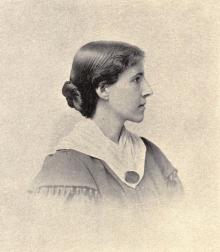
“We as women”
There’s a cry in the air about us–
We hear it before, behind–
Of the way in which “We, as women,”
Are going to lift mankind!
With our white frocks starched and ruffled,
And our soft hair brushed and curled–
Hats off! for “We, as women,”
Are coming to save the world.
Fair sisters, listen one moment–
And perhaps you’ll pause for ten:
The business of women as women
Is only with men as men!
What we do, “We, as women,”
We have done all through our life;
The work that is ours as women
Is the work of mother and wife.
But to elevate public opinion,
And to lift up erring man,
Is the work of the Human Being;
Let us do it–if we can.
But wait, warm-hearted sisters–
Not quite so fast, so far.
Tell me how we are going to lift a thing
Any higher than we are!
We are going to “purify politics,”
And to “elevate the press.”
We enter the foul paths of the world
To sweeten and cleanse and bless.
To hear the high things we are going to do,
And the horrors of man we tell,
One would think, “We, as women,” were angels,
And our brothers were fiends of hell.
We, that were born of one mother,
And reared in the self-same place,
In the school and the church together,
We of one blood, one race!
Now then, all forward together!
But remember, every one,
That ’tis not by feminine innocence
The work of the world is done.
The world needs strength and courage,
And wisdom to help and feed–
When, “We, as women” bring these to man,
We shall lift the world indeed.
Charlotte Perkins Gilman
(1860-1935)
“We as women”
Suffrage Songs and Verses
• fleursdumal.nl magazine
More in: # Classic Poetry Archive, Archive G-H, Archive G-H, Feminism
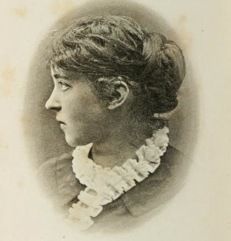
Évolutions
Où sont-ils disparus, les Peuples innombrables,
Autrefois échappés des gouffres du néant.
Pareils aux légions dévorées par les sables
Que la vague dépose au bord de l’Océan ?
Un jour, ils sont venus en conquérants superbes,
Ils ont soumis le globe, ils ont régné sur lui ;
Puis un seul coup de faux qui tranchait le champ d’herbes
Les a plongés soudain dans l’éternelle nuit.
On a vu s’écrouler, leurs pouvoirs séculaires,
Babylone, Ninive, et Thèbes et Memphis ;
Ces cités n’ont laissé que débris éphémères,
Témoins inanimés, argile enseveli.
Dans ces lieux aujourd’hui, vastes déserts stériles,
S’étalaient les splendeurs d’un luxe raffiné.
Et le peuple joyeux qui remplissait les villes
A l’immortalité se croyait destiné.
Il n’a fallu qu’un jour et peut-être qu’une heure
Pour renverser leurs murs, leurs temples et leurs dieux,
Pour faire des palais somptueux la demeure
Des serpents du désert et des oiseaux des cieux.
D’autres ont succédé, rescapés des naufrages ;
D’autres ont recueilli leurs vestiges divers.
Ruines disséminées sur l’Océan des âges,
Épaves d’un vaisseau gisant au fond des mers.
Alors, Art et Science ont entr’ouvert leurs ailes
Comme un aigle superbe au vol capricieux ;
Ils se sont envolés dans des contrées nouvelles
Pour y refaire un nid sous l’éclat d’autres cieux.
Ce fut d’abord l’Asie où l’histoire du monde
Naît sous les verts bosquets de la terre d’Éden,
L’Asie, astre éclatant perçant la nuit profonde
Tel le soleil levant dans l’ombre du matin.
Avec elle l’Afrique et la fertile Égypte
Où le Nil apparaît comme un dieu bienfaisant,
Thèbes et sa nécropole énorme, sombre crypte
D’où les morts assemblés regardaient le présent.
Ils choisirent après, l’Europe, l’Italie,
Ce pays mollement bercé par les flots bleus,
Où, dans le vague écho d’une plainte affaiblie,
L’onde vient expirer sur le sable onduleux.
L’Italie, où semblable à quelque pierre fine
Enchâssée au milieu d’un écrin précieux,
Rome, que soutenait la volonté divine,
Des peuples étonnés éblouissait les yeux.
Elle-même à son tour fut prise et renversée ;
Elle a vu se ternir sa gloire et sa splendeur ;
Ce qu’il reste en ce jour de sa beauté passée
N’est qu’un lointain reflet de sa vieille grandeur.
Puis ce fut tout le Nord de l’Europe ignorée
Qui devint le séjour du savoir et des arts ;
C’est elle maintenant la première contrée,
Et les hommes sur elle attachent leurs regards.
Jusqu’à quand ? — Nul ne sait. Il est un Nouveau Monde
Au-delà des grands flots qui s’accroît jour par jour ;
Sa frontière est immense et sa terre est féconde,
L’Amérique, peut-être, aura demain son tour.
Puis elle passera. — Quelle terre lointaine
Recevra le dépôt par d’autres égaré ?
Dans quelle région, chez quelle race humaine
Luiront encor les feux de ce flambeau sacré ?
Oui ! dans quelque mille ans, dans moins longtemps peut-être,
Où seront nos palais, nos empires, nos lois ? —
Le Temps, ce niveleur farouche, ce grand maître,
Aura tout transformé pour la centième fois.
Et nos belles cités dont nous nous faisons gloire,
Où devaient à toujours se succéder nos fils,
Ne seront plus qu’un rêve à la triste mémoire,
Comme vous, ô Ninive, ô Thèbes, ô Memphis !
Bevaix, 28 août 1882
Alice De Chambrier
(1861-1882)
Évolutions
• fleursdumal.nl magazine
More in: Alice De Chambrier, Archive C-D, Archive C-D, Chambrier, Alice De

Just A Woman
You ask me why I love her;
Not a charm can you discover!
Would you see
The heart that a shut rose is,
And whose beauty ne’er uncloses
Save for me?
She is not rich or clever,
But her speeches thrill me ever,
And with bliss
My heart her whisper flutters,
Though the wisest word she utters
Is a kiss.
All evil things have shunned her,
And with a wide-eyed wonder
Is she tasked,
What lavish god has given
In her earth so much of heaven
All unasked?
She has no gifts or graces,
But the gladness in her face is
Sought of kings;
She cannot chant a measure,
But her heart with a grave pleasure
Ever sings.
Her gown is of the whitest
But the hem is soiled the slightest:
Little worth,
She has no wings to fly with,
And she prefers to hie with
Me on earth.
There is no hint of heaven
Or glimpse of deep thought even
In her eyes;
She is warm and she is human,
Just a weak and wilful woman —
Not too wise.
Her thousand beauties singing,
I have not said how clinging
Are her arms;
But, not loved and not the lover
Dare you ever hope discover
Half her charms?
Arthur Adams
(1872-1936)
Just A Woman
• fleursdumal.nl magazine
More in: Adams, Arthur, Archive A-B, Archive A-B, THEATRE

Little Red Riding-Hood
If you listen, children, I will tell
The story of little Red Riding-hood:
Such wonderful, wonderful things befell
Her and her grandmother, old and good
(So old she was never very well),
Who lived in a cottage in a wood.
Little Red Riding-hood, every day,
Whatever the weather, shine or storm,
To see her grandmother tripped away,
With a scarlet hood to keep her warm,
And a little mantle, soft and gay,
And a basket of goodies on her arm.
A pat of butter, and cakes of cheese,
Were stored in the napkin, nice and neat;
As she danced along beneath the trees,
As light as a shadow were her feet;
And she hummed such tunes as the bumble-bees
Hum when the clover-tops are sweet.
But an ugly wolf by chance espied
The child, and marked her for his prize.
“What are you carrying there?” he cried;
“Is it some fresh-baked cakes and pies?”
And he walked along close by her side,
And sniffed and rolled his hungry eyes.
“A basket of things for granny, it is,”
She answered brightly, without fear.
“Oh, I know her very well, sweet miss!
Two roads branch towards her cottage here;
You go that way, and I’ll go this.
See which will get there first, my dear!”
He fled to the cottage, swift and sly;
Rapped softly, with a dreadful grin.
“Who’s there?” asked granny. “Only I!”
Piping his voice up high and thin.
“Pull the string, and the latch will fly!”
Old granny said; and he went in.
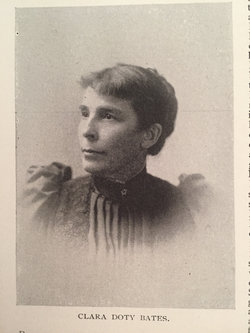
He glared her over from foot to head;
In a second more the thing was done!
He gobbled her up, and merely said,
“She wasn’t a very tender one!”
And then he jumped into the bed,
And put her sack and night-cap on.
And he heard soft footsteps presently,
And then on the door a timid rap;
He knew Red Riding-hood was shy,
So he answered faintly to the tap:
“Pull the string and the latch will fly!”
She did: and granny, in her night-cap,
Lay covered almost up to her nose.
“Oh, granny dear!” she cried, “are you worse?”
“I’m all of a shiver, even to my toes!
Please won’t you be my little nurse,
And snug up tight here under the clothes?”
Red Riding-hood answered, “Yes,” of course.
Her innocent head on the pillow laid,
She spied great pricked-up, hairy ears,
And a fierce great mouth, wide open spread,
And green eyes, filled with wicked leers;
And all of a sudden she grew afraid;
Yet she softly asked, in spite of her fears:
“Oh, granny! what makes your ears so big?”
“To hear you with! to hear you with!”
“Oh, granny! what make your eyes so big?”
“To see you with! to see you with!”
“Oh, granny! what makes your teeth so big?”
“To eat you with! to eat you with!”
And he sprang to swallow her up alive;
But it chanced a woodman from the wood,
Hearing her shriek, rushed, with his knife,
And drenched the wolf in his own blood.
And in that way he saved the life
Of pretty little Red Riding-hood.
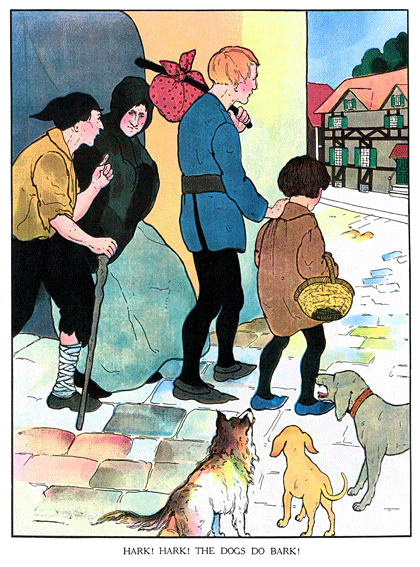
Hark, hark
The dogs do bark
Beggars are coming to town;
Some in jags,
Some in rags,
And some in velvet gowns.
Clara Doty Bates
(1838 – 1895)
Little Red Riding-Hood
Versified by Mrs. Clara Doty Bates
fleursdumal.nl magazine
More in: Archive A-B, Archive A-B, Bates, Clara Doty, Children's Poetry, Grimm, Andersen e.o.: Fables, Fairy Tales & Stories, Tales of Mystery & Imagination
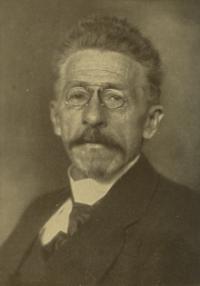
“Hab’ Sonne im Herzen”
Hab’ Sonne im Herzen, obs stürmt oder schneit
Ob der Himmel voll Wolken, die Erd voller Streit.
Hab’ Sonne im Herzen, dann komme was mag,
das leuchtet voll Licht dir den dunkelsten Tag.
Hab’ ein Lied auf den Lippen mit fröhlichem Klang
und macht auch des Alltags Gedränge dich bang!
Hab’ ein Lied auf den Lippen, dann komme was mag,
das hilft dir verwinden den einsamsten Tag!
Hab’ ein Wort auch für andre in Sorg’ und in Pein,
und sag, was dich selber so frohgemut lässt sein:
Hab’ ein Lied auf den Lippen, verlier nie den Mut,
hab’ Sonne im Herzen, und alles wird gut.
Cäsar Flaischlen
(1864-1920)
“Hab’ Sonne im Herzen”
• fleursdumal.nl magazine
More in: # Classic Poetry Archive, Archive E-F, Archive E-F
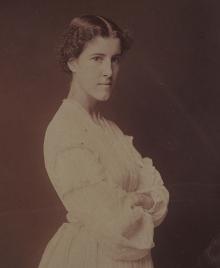
Females
The female fox she is a fox;
The female whale a whale;
The female eagle holds her place
As representative of race
As truly as the male.
The mother hen doth scratch for her chicks,
And scratch for herself beside;
The mother cow doth nurse her calf,
Yet fares as well as her other half
In the pasture free and wide.
The female bird doth soar in air;
The female fish doth swim;
The fleet-foot mare upon the course
Doth hold her own with the flying horse–
Yea and she beateth him!
One female in the world we find
Telling a different tale.
It is the female of our race,
Who holds a parasitic place
Dependent on the male.
Not so, saith she, ye slander me!
No parasite am I.
I earn my living as a wife;
My children take my very life;
Why should I share in human strife,
To plant and build and buy?
The human race holds highest place
In all the world so wide,
Yet these inferior females wive,
And raise their little ones alive,
And feed themselves beside.
The race is higher than the sex,
Though sex be fair and good;
A Human Creature is your state,
And to be human is more great
Than even womanhood!
The female fox she is a fox;
The female whale a whale;
The female eagle holds her place
As representative of race
As truly as the male.
Charlotte Perkins Gilman
(1860-1935)
Females
Suffrage Songs and Verses
• fleursdumal.nl magazine
More in: # Classic Poetry Archive, Archive G-H, Archive G-H, Feminism

Time-Stone
Hallo, Metropolitan –
Ubiquitous windows staring all ways,
Red eye notching the darkness.
No use to ogle that slip of a moon.
This midnight the moon,
Playing virgin after all her encounters,
Will break another date with you.
You fuss an awful lot,
You flight of ledger books,
Overrun with multiple ant-black figures
Dancing on spindle legs
An interminable can-can.
But I’d rather… like the cats in the alley… count time
By the silver whistle of a moonbeam
Falling between my stoop-shouldered walls,
Than all your tally of the sunsets,
Metropolitan, ticking among stars.
Lola Ridge
(1873-1941)
Time-Stone
• fleursdumal.nl magazine
More in: Archive Q-R, Archive Q-R, Ridge, Lola

Canticle Of The Babe
I
Over the broken world, the dark gone by,
Horror of outcast darkness torn with wars;
And timeless agony
Of the white fire, heaped high by blinded Stars,
Unfaltering, unaghast;–
Out of the midmost Fire
At last,–at last,–
Cry! …
O darkness’ one desire,–
O darkness, have you heard?–
Black Chaos, blindly striving towards the Word?
–The Cry!
Behold thy conqueror, Death!
Behold, behold from whom
It flutters forth, that triumph of First-Breath,
Victorious one that can but breathe and cling,–
This pulsing flower,–this weaker than a wing,
Halcyon thing!–
Cradled above unfathomable doom.
II
Under my feet, O Death,
Under my trembling feet!
Back, through the gates of hell, now give me way.
I come.–I bring new Breath!
Over the trampled shards of mine own clay,
That smoulder still, and burn,
Lo, I return!
Hail, singing Light that floats
Pulsing with chorused motes:–
Hail to thee, Sun, that lookest on all lands!
And take thou from my weak undying hands,
A precious thing, unblemished, undefiled:–
Here, on my heart uplift,
Behold the Gift,–
Thy glory and my glory, and my child!
III
(And our eyes were opened; eyes that had been holden.
And I saw the world, and the fruits thereof.
And I saw their glories, scarlet-stained and golden,
All a crumbled dust beneath the feet of Love.
And I saw their dreams, all of nothing worth;
But a path for Love, for Him to walk above,
And I saw new heaven, and new earth.)
IV
The grass is full of murmurs;
The sky is full of wings;
The earth is full of breath.
With voices, choir on choir
With tongues of fire,
They sing how Life out-sings–
Out-numbers Death.
V
Who are these that fly;
As doves, and as doves to the windows?
Doves, like hovering dreams round Love that slumbereth;
Silvering clouds blown by,
Doves and doves to the windows,–
Warm through the radiant sky their wings beat breath.
They are the world’s new-born:
Doves, doves to the windows!
Lighting, as flakes of snow;
Lighting, as flakes of flame;
Some to the fair sown furrows;
Some to the huts and burrows
Choked of the mire and thorn,–
Deep in the city’s shame.
Wind-scattered wreaths they go,
Doves, and doves, to the windows;
Some for worshipping arms, to shelter and fold, and shrine;
Some to be torn and trodden,
Withered and waste, and sodden;
Pitiful, sacred leaves from Life’s dishonored vine.
VI
O Vine of Life, that in these reaching fingers,
Urges a sunward way!
Hold here and climb, and halt not, that there lingers
So far outstripped, my halting, wistful clay.
Make here thy foothold of my rapturous heart,–
Yea, though the tendrils start
To hold and twine!
I am the heart that nursed
Thy sunward thirst.–
A little while, a little while, O Vine,
My own and never mine,
Feed thy sweet roots with me
Abundantly.
O wonder-wildness of the pushing Bud
With hunger at the flood,
Climb on, and seek, and spurn.
Let my dull spirit learn
To follow with its longing, as it may,
While thou seek higher day.–
But thou, the reach of my own heart’s desire,
Be free as fire!
Still climb and cling; and so
Outstrip,–outgrow.
O Vine of Life, my own and not my own,
So far am I outgrown!
High as I may, I lift thee, Soul’s Desire.
–Lift thou me higher.
And thou, Wayfaring Woman, whom I meet
On all the highways,–every brimming street,
Lady Demeter, is it thou, grown gaunt
With work and want?
At last, and with what shamed and stricken eyes,
I see through thy disguise
Of drudge and Exile,–even the holy boon
That silvers yonder in the Harvest-moon;–
That dimly under glows
The furrows of thy worn immortal face,
With mother-grace.
O Queen and Burden-bearer, what of those
To whom thou gavest the lily and the rose
Of thy far youth?… For whom,
Out of the wondrous loom
Of thine enduring body, thou didst make
Garments of beauty, cunningly adorned,
But only for Death’s sake!
Largess of life, but to lie waste and scorned.–
Could not such cost of pain,
Nor daily utmost of thy toil prevail?–
But they must fade, and pale,
And wither from thy desolated throne?–
And still no Summer give thee back again
Thine own?
Lady of Sorrows,–Mother,–Drudge august.
Behold me in the dust.
Josephine Preston Peabody
(1874 – 1922)
Canticle Of The Babe
• fleursdumal.nl magazine
More in: # Classic Poetry Archive, Archive O-P, Archive O-P

Writing
A man who keeps a diary, pays
Due toll to many tedious days;
But life becomes eventful then
His busy hand forgets the pen.
Most books, indeed, are records less
Of fullness than of emptiness.
William Allingham
(1824 – 1889)
Writing
• fleursdumal.nl magazine
More in: Allingham, William, Archive A-B, Archive A-B

Her Portrait Immortal
Must I believe this beauty wholly gone
That in her picture here so deathless seems,
And must I henceforth speak of her as one
Tells of some face of legend or of dreams,
Still here and there remembered–scarce believed,
Or held the fancy of a heart bereaved.
So beautiful she–was; ah! “was,” say I,
Yet doubt her dead–I did not see her die.
Only by others borne across the sea
Came the incredible wild blasphemy
They called her death–as though it could be true
Of such an immortality as you!
True of these eyes that from her picture gaze,
Serene, star-steadfast, as the heaven’s own eyes;
Of that deep bosom, white as hawthorn sprays,
Where my world-weary head forever lies;
True of these quiet hands, so marble-cool,
Still on her lap as lilies on a pool.
Must I believe her dead–that this sweet clay,
That even from her picture breathes perfume,
Was carried on a fiery wind away,
Or foully locked in the worm-whispering tomb;
This casket rifled, ribald fingers thrust
‘Mid all her dainty treasure–is _this_ dust!
Once such a dewy marvel of a girl,
Warm as the sun, and ivory as the moon;
All gone of her, all lost–except this curl
Saved from her head one summer afternoon,
Tied with a little ribbon from her breast–
This only mine, and Death’s now all the rest.
Must I believe it true! Bid me not go
Where on her grave the English violets blow;
Nay, leave me–if a dream, indeed, it be–
Still in my dream that she is somewhere she,
Silent, as was her wont. It is a lie–
She is not dead–I did not see her die.
Richard Le Gallienne
(1866 – 1947)
Her Portrait Immortal
From: The lonely Dancer and other Poems, 1913
• fleursdumal.nl magazine
More in: Archive G-H, Archive G-H, Gallienne, Richard Le
Thank you for reading Fleurs du Mal - magazine for art & literature